| Srl | Item |
| 1 |
ID:
119710
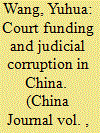

|
|
|
| 2 |
ID:
095153
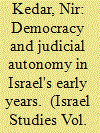

|
|
|
|
|
| Publication |
2010.
|
| Summary/Abstract |
The article investigates the question of judicial autonomy in the State of Israel during the first five years of independence. It examines to what extent the government and the Knesset were involved in the procedure of appointing Supreme Court judges, and then discusses the involvement of these authorities in the courts' ongoing work. An examination of the full range of evidence from the period leads to the conclusion that, since the establishment of Israel, there were no unsuitable attempts to influence judges to issue unfair rulings or to restrict their autonomy in other ways. The mistaken notion that judges in the early years of Israel were not respected or appreciated and that their autonomy was in practice flawed should therefore be abandoned, acknowledging the efforts of the first Israelis to reconcile the complex principles of democracy and the rule of law
|
|
|
|
|
|
|
|
|
|
|
|
|
|
|
|
| 3 |
ID:
146676
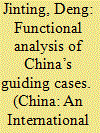

|
|
|
|
|
| Contents |
This article starts from the essential differences between the effects of China’s guiding cases and precedents of the US Common Law system. Then, it makes a factual study of what guiding cases have achieved in relation to the well-known functions of case law, and finds that guiding cases similarly function to adapt law to social needs and strengthen judicial autonomy. Following that, it adopts a cost–benefit approach to analyse differences in relation to the realisation of those functions, and finds that they can be explained in that approach. It concludes with the understanding that guiding cases serve as a tool of the Supreme People’s Court of China, and that there are limitations to their functions and Chinese characteristics.
|
|
|
|
|
|
|
|
|
|
|
|
|
|
|
|
| 4 |
ID:
100997
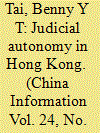

|
|
|
|
|
| Publication |
2010.
|
| Summary/Abstract |
To assess the degree of judicial autonomy under an autonomous framework, there are five criteria concerning the courts of the autonomous entity: (1) judicial independence; (2) jurisdiction on purely local matters; (3) the power of final adjudication; (4) the power of final interpretation of its own constitution; and (5) a fair mechanism to resolve disputes arising from conflicts between the exercise of powers by the autonomous entity and the sovereign state. The judicial autonomy of Hong Kong after China resumed to exercise sovereignty over Hong Kong is examined according to these criteria. The substantial differences between Hong Kong's economic, legal, constitutional, and political systems and China's may explain the subtle conflicts that the Hong Kong judiciary has encountered in the last 13 years. The Hong Kong Judiciary has learned that it can only exercise its judicial autonomy in accordance with its sense of constitutional justice inherited mainly from the common law if it can tactfully handle the inherent differences between "one country" and "two systems." However, whether that means a weakened version of judicial autonomy or a strategic way to achieve the highest attainable degree of judicial autonomy within constraints is a matter on which commentators have different opinions.
|
|
|
|
|
|
|
|
|
|
|
|
|
|
|
|
| 5 |
ID:
192631
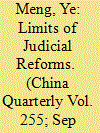

|
|
|
|
|
| Summary/Abstract |
This article investigates the implementation effects of China's recent reforms to centralize its court system and offers an explanation of why such centralization efforts largely failed. Drawing upon in-depth interviews with judicial personnel from four localities, the study shows that local courts’ structural dependence upon same-level party-states is perpetuated or, in some cases, is even exacerbated, despite the unprecedented reform plans to centralize the budgetary and personnel management of the judicial system. Further investigation finds that, contrary to what existing assessments suggest, implementation failure is less a result of regional disparities in resources than of the party-state's own reliance on its horizontal line of power concentration and hierarchy, which is a core feature of the Chinese Communist Party's (CCP) one-party rule and hinders the party-state's own attempts to strengthen both judicial autonomy and centralization. The article thus challenges two extant notions on recent political-legal developments in China – that the CCP regime has substantially centralized its judiciary along the vertical line, and that judicial autonomy can continue to increase and manifest both under the conditions of, and serving the purpose of, deepening one-party authoritarianism.
|
|
|
|
|
|
|
|
|
|
|
|
|
|
|
|
| 6 |
ID:
186946
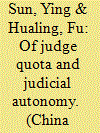

|
|
|
|
|
| Summary/Abstract |
This article presents the findings of original research on “judge quota” reform. The reform's agenda was essentially aimed at professionalization: by edging out a given percentage of judges, only the better qualified judges would be re-appointed to create a more professionalized judiciary. A key component of the reform was to reduce the level and the intensity of both political and bureaucratic control over judges in adjudication and to decentralize judicial power to the rank-and-file judges, restoring individualized judging while enhancing judicial accountability. This article critically examines the potential and limits of the judge quota reform in the context of incremental legal reform in a party-state.
|
|
|
|
|
|
|
|
|
|
|
|
|
|
|
|
| 7 |
ID:
100994
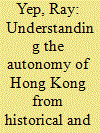

|
|
|
|
|
| Publication |
2010.
|
| Summary/Abstract |
The exercise of autonomy is a product of the political process of mutual learning by the center and the periphery. Propriety of action and response from both sides is not judged simply on the basis of formal legal permissibility, but is also deciphered with reference to experience in previous encounters. Earlier exchanges and responses to interactions create institutional memory, protocols for action, and limits to legitimate expectations. For both the Hong Kong Special Administrative Region and the central people's government, the new framework, through mutual adjustment and adaptation, is still in the process of being made. Their parallel experience in handling the central and local relationship can serve as a good basis for their exchanges. The articles included in this issue provide comparisons in temporal and spatial terms that are crucial for understanding the autonomy of Hong Kong after 1997. These contributions do not simply reconfirm the disposition of local players to defend and assert their interests vis-a-vis the center; the discussion here also identifies factors shaping the manifestation of autonomy in the case of Hong Kong. Trust, reciprocity, agenda of the sovereign power, and resolution of conflict appear to be significant in shaping the outcome of centre-periphery interaction.
|
|
|
|
|
|
|
|
|
|
|
|
|
|
|
|